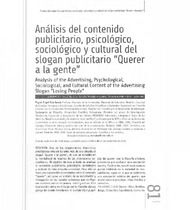| dc.contributor.author | Ruiz García, Miguel Ángel | |
| dc.coverage.spatial | Seccional Medellín | spa |
| dc.date.accessioned | 2020-12-10T19:31:48Z | |
| dc.date.available | 2020-12-10T19:31:48Z | |
| dc.date.issued | 2009 | |
| dc.identifier.uri | http://hdl.handle.net/20.500.11912/7187 | |
| dc.description | p. 81 - 100 | spa |
| dc.description.abstract | Una de las corporaciones financieras prestigiosas empleó durante más de una década el slogan "Querer a la gente", el cual se acreditó en la mentalidad de muchos de los ahorradores colombianos. El objetivo de este articulo es analizar el contenido publicitario, psicológico, sociológico y cultural de esta etiqueta comercial. Para ello se hace una exploración genealógica sobre el concepto "Querer", así como un análisis de su apropiación y divulgación en los canales culturales que configuran nuestros modos de pensar, sentir y actuar. Esta exploración entra en diálogo con la filosofía clásica griega de donde heredamos el sentido ético y politico del querer; con la filosofía cristiana y moderna que acuñaron una concepción moral y, finalmente, con el modo como el querer cristaliza en la sociedad de consumidores, suelo en el que se sedimenta una concepción estética del querer, que anuda nuestra prácticas, ritos, hábitos y creencias. | spa |
| dc.description.abstract | "Loving People," the slogan that stayed for a long time with many Colombian savers was used by one of the most prestigious financial corporations for more than a decade. This article intends to analyze the advertising, psychological, and cultural contents of such commerciallabel. There is a genealogic exploration on the term 'Love, , along with theanalysis of its acceptance and advertising throughout the cultural channels that make part of our way of thinking, feeling, and acting. The classic Greek philosophy from which we inherited the ethical and political sense of love; the modern and Christian philosophy, which coined a morol conception; and the way the concept of love is seen by the consumer society, which poses an aesthetic idea that ties our daily lives, rites, habits, and beliefs were present in this exploration. | spa |
| dc.format.mimetype | application/pdf | |
| dc.language.iso | spa | |
| dc.publisher | Universidad Pontificia Bolivariana | spa |
| dc.relation.ispartof | Iconofacto | spa |
| dc.rights | Attribution-NonCommercial-NoDerivatives 4.0 International | * |
| dc.rights.uri | http://creativecommons.org/licenses/by-nc-nd/4.0/ | * |
| dc.subject | Querer | spa |
| dc.subject | Ética | spa |
| dc.subject | Estética | spa |
| dc.subject | Juego | spa |
| dc.subject | Seducción | spa |
| dc.subject | Espectáculo | spa |
| dc.subject | Consumo | spa |
| dc.subject | Will | spa |
| dc.subject | Ethics | spa |
| dc.subject | Aesthetics | spa |
| dc.subject | Game | spa |
| dc.subject | Seduction | spa |
| dc.subject | Entertainment | spa |
| dc.subject | Consumption | spa |
| dc.title | Análisis del contenido publicitario, psicológico, sociológico y cultural del slogan publicitario "Querer a la gente" | spa |
| dc.title.alternative | Analysis of the Advertising, Psychological, Sociological, and Cultural Content of the Advertising Slogan "Loving People" | spa |
| dc.type | article | spa |
| dc.rights.accessRights | openAccess | spa |
| dc.type.hasVersion | publishedVersion | spa |
| dc.description.sectional | Medellín | spa |
| dc.identifier.instname | instname:Universidad Pontificia Bolivariana | spa |
| dc.identifier.reponame | reponame:Repositorio Institucional de la Universidad Pontificia Bolivariana | spa |
| dc.identifier.repourl | repourl:https://repository.unab.edu.co/ | |


